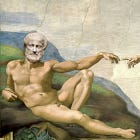Why Do Liberals Keep Getting Schooled on Critical Thinking?
A model for understanding the Left's challenges with reasoning
In Goethe’s poem Zauberlehrling (“The Sorcerer's Apprentice”), the eponymous apprentice summons magical forces that eventually take on a life of their own and spiral out of control, causing more harm than good in an unpredictable fashion.
Any resemblance to modern Liberals is not a coincidence; it is a perfect cautionary tale on the perils of letting your wishful thinking interfere with reality. It is not difficult to see that progressives share a set of common traits with the apprentice, which define their personalities and the outcome of their actions:
Naïve rationalism: a belief that desired outcomes can only be the product of direct control;
Aesthetic worldview: the tendency to base one’s understanding of the world primarily on sensory perceptions, leading to a narrow and superficial understanding of reality;
Narcissism: an exaggerated sense of self-importance and a need for constant validation and attention; and
Oedipus complex: also known as ‘daddy issues’, an aggressive, irrational attitude towards the accomplishments of your predecessors.
If you view Goethe’s poem as a tragedy in four acts — each exploring one of the traits above — the work reveals striking similarities between the apprentice and modern-day Liberals. It is as if Goethe was predicting the attitudes and behaviours of modern progressives over two centuries in the future…
Act I — Naïve Thinking, the Genesis of Chaos
“Now that the old sorcerer has left me on my own at last,
I can make his forces labor just exactly as I ask.
I’ve learned in this tower, all his words and spells,
With these mental powers, his art is mine as well.”
Just like the apprentice, Liberals often believe that they can accomplish whatever they desire simply by the sheer virtue of holding power. This was the mindset in 2013 when Democrats voted to end the filibuster for judicial nominees, thrilled to confirm Obama’s choices without opposition.
However, they failed to consider that an eventual Republican president would use the absence of filibuster to appoint three SCOTUS Justices, who would ultimately dismantle the cherished — and now defunct — Roe v. Wade decision.
This is an example of what Karl Popper referred to as ‘naïve rationalism,’ a belief often professed by those who acknowledge its fallacy yet regard it as a harmless deception: we can manifest any desired state of nature simply by declaring it ought to exist, for example, “Free Palestine!”, “End fossil fuels!”, “Trans women are women!”
A kind of self-deception where we think we can harness the spontaneous order of society while, at the same time, actively shaping it to our will. This is not just misguided; it’s tragically flawed since it has always been acknowledging our limitations that have allowed humans to utilise their abilities to their full extent.
Under the enlightened influence of Rousseau, Condorcet, Voltaire, and Thomas Hobbes—who first applied Cartesian ideas to social and moral ‘sciences’—the belief that critical thinking requires recognising limitations was supplanted by the ‘constructivist ideal,’ which holds that all human institutions should be consciously created through human action; leading to the notion that only intentionally designed, or ‘planned,’ institutions are beneficial.
This idea underpins, for example, the ‘democratic socialist’ left’s disdain for free markets, deregulation, and religious institutions. It also underpins the sorcerer’s apprentice’s mistakes, arrogantly believing he could control forces beyond his grasp.
Act II — Growing Pains and Refusing to Leave the Aesthetic Stage of Life
“So come on, you dry old broomstick! Wrap yourself in these old rags;
Servant is what you are, toothpick; Obey me now and do not lag!
Stand up here on two legs, screw a head on top,
Run down to the stream’s edge, with the water pot!”
Liberals, it seems, don’t want to grow up, like a bunch of Peter Pans on puberty blockers. They remain stuck in what Kierkegaard described as the ‘aesthetic’ stage of life— characterised by a focus on seeking pleasure and indulgence in sensory experiences, concerned only with the immediate present rather than the future — or the past.
This idea helps explain why many progressives might display behaviours such as a fascination with drugs, unconventional sex, and conceptual art; a desire to change fundamental aspects of human nature for endless hedonistic pursuits, and a tendency to become easily bored or restless when desires go unmet.
Living in the aesthetic stage is, of course, an immature and superficial approach that focuses solely on self-gratification and ignores the needs or desires of others. It is ultimately unfulfilling and fails to provide a sense of meaning or purpose in life.
This belief in one’s invincibility, coupled with a blind trust that everything one desires is to one’s advantage, can lead to disregarding the consequences of their actions. Liberals don’t build for the future. They deconstruct for now.
Act III — The Descent Into Narcissistic Madness
Look, it’s running to the river; see, it’s made it to the stream,
Like an arrow from a quiver, shooting its way straight to me.
There and back already, for the second time,
Filling buckets stead’ly, as the water climbs!
When things go awry, progressives often refuse to accept any personal responsibility. They can do no wrong, unwilling to consider their role in any failures. They block out criticism—covering their eyes and ears, though never their mouths—, acting as if they could crush reality simply by stomping their feet.
“Cease now! Cease now! Stand and heed me! Halt! Obey! I must be heard!
Oh now, what now, can’t believe this! I don’t know the magic word!”
This lack of rationality often manifests in rioting, engaging in ritualistic chanting, and throwing tantrums. Driven by a desire to conform reality to fit their sensory perceptions, they lust to censor, suppress, control, standardise and homogenise dissenting views. Their narcissism convinces them that any negative circumstances must be the work of external foes, not the consequences of their actions.
Thus, they craft imaginary conspiracies, seeing monsters everywhere, such as the all-powerful and pervasive ‘Patriarchy,’ actively working to oppress them at every turn for centuries.
“No, can’t take this any longer; nasty creature! How deceitful!
Oh! This couldn’t be much wronger! Ghastly features! Oh! It’s evil!”
Beyond shirking responsibility for their failures, narcissistic Liberals often indulge in fantasies of success, power, and attractiveness; exhibiting an exaggerated sense of entitlement, and expecting special treatment and privileges. When they fail to achieve these through their own merits — which is often the case — they are quick to claim credit for someone else’s achievements.
‘I project, therefore I am.’ Just as they project their failures onto others, they attribute others’ successes to themselves, like a bastard child of Freud and Descartes, seasoned with a bad dash of Nietzsche, as is their custom.
This leads them to conjure imaginary heroes: celebrities, politicians, scientists, and others, to whom they ascribe qualities and capabilities that do not truly exist. In their eagerness to align themselves with these imagined virtues, they suspend any healthy scepticism.
“Just one word, to end this madness! Argh, it’s going to be my doom!
Endless water! Oh, what badness! Stop, please and just be a broom!
Nonstop it keeps hauling water from the stream,
Soon I will be crawling, drowned among the bream.”
If the world still appears flawed to them, it’s because they have yet to fully impose their will upon it. There always seems to be something missing in their perception of reality.
They become obsessed with adding new elements to the system in pursuit of perfection, only to find themselves further from it with each attempt. Consider their response to Covid: lockdowns, experimental vaccines, mask mandates, vaccine passports... There’s always another step they deem necessary. They persist because admitting error is simply not an option — as the mirror insists on telling them they are not the fairest of all.
Act IV — The Tragicomedy of Facing Your Oedipus Complex
Still they’re running! Wet and wetter, down the steps, the water’s falling.
How appalling, all this water! Lord and Master! Hear me calling!
Oh, here comes my master! Help me Lord, I plead!
Spirits I have conjured, no longer pay me heed.
The Oedipus complex is a psychoanalytic concept developed by Freud; it refers to a child’s desire for their ‘submissive’ parent and jealousy and rivalry towards their ‘dominant’ parent. This in itself explains the Liberal’s irrational affinity for any group perceived as oppressed.
Healthy humans experience the Oedipal complex during childhood and move past it after puberty. But, as illustrated in Act II, progressives seem perpetually stuck in an adolescent phase, hooked on puberty-blocking mental placebos.
The resolution of the Oedipus complex is crucial for developing a functional adult personality, including the forgiveness of the ‘sins of the father’ by acknowledging you are just as fallible. The apprentice in the tale has learned this lesson, but tragically, the Liberals have not.
Living in denial, they attempt to subvert nature, showing disdain for tradition, customs, and history. They aim to play God but end up playing Dr. Frankenstein, constantly on the brink of a mental breakdown they have brought upon themselves, but blame on malevolent forces from the past.
This vicious cycle has taken a contemporary twist that Goethe could never have foreseen: the rise of millions of sorcerer’s apprentices, bolstered by an interconnected ecosystem, amplified by mass media. This new reality fosters the illusion that they can bypass the traditional structures necessary for resolving their issues, simply reinforcing the belief that they are perfect as they are.
Unlike the lone apprentice, who was compelled to face his errors, his modern peers now face the very bleak prospect of going through life without dealing with their flaws — a tragedy in infinite acts.









I would say progressives rather than liberals. Otherwise, well put.